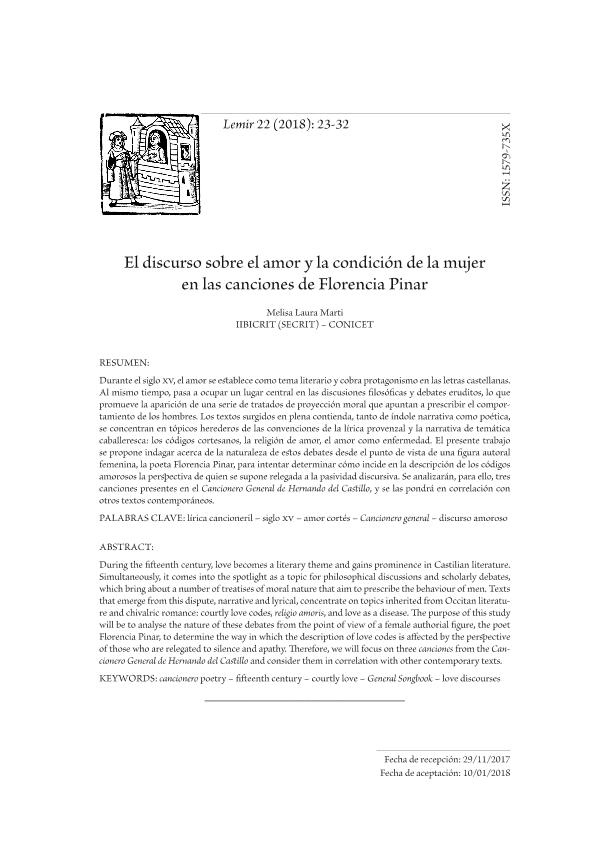Mostrar el registro sencillo del ítem
dc.contributor.author
Marti, Melisa Laura

dc.date.available
2019-11-15T22:49:36Z
dc.date.issued
2018-01
dc.identifier.citation
Marti, Melisa Laura; El discurso sobre el amor y la condición de la mujer en las canciones de Florencia Pinar; Universitat de València; Lemir; 22; 1-2018; 23-32
dc.identifier.issn
1579-735X
dc.identifier.uri
http://hdl.handle.net/11336/89104
dc.description.abstract
Durante el siglo XV, el amor se establece como tema literario y cobra protagonismo en las letras castellanas. Al mismo tiempo, pasa a ocupar un lugar central en las discusiones filosóficas y debates eruditos, lo que promueve la aparición de una serie de tratados de proyección moral que apuntan a prescribir el comportamiento de los hombres. Los textos surgidos en plena contienda, tanto de índole narrativa como poética, se concentran en tópicos herederos de las convenciones de la lírica provenzal y la narrativa de temática caballeresca: los códigos cortesanos, la religión de amor, el amor como enfermedad. El presente trabajo se propone indagar acerca de la naturaleza de estos debates desde el punto de vista de una figura autoral femenina, la poeta Florencia Pinar, para intentar determinar cómo incide en la descripción de los códigos amorosos la perspectiva de quien se supone relegada a la pasividad discursiva. Se analizarán, para ello, tres canciones presentes en el Cancionero General de Hernando del Castillo, y se las pondrá en correlación con otros textos contemporáneos.
dc.description.abstract
During the fifteenth century, love becomes a literary theme and gains prominence in Castilian literature. Simultaneously, it comes into the spotlight as a topic for philosophical discussions and scholarly debates, which bring about a number of treatises of moral nature that aim to prescribe the behaviour of men. Texts that emerge from this dispute, narrative and lyrical, concentrate on topics inherited from Occitan literature and chivalric romance: courtly love codes, religio amoris, and love as a disease. The purpose of this study will be to analyse the nature of these debates from the point of view of a female authorial figure, the poet Florencia Pinar, to determine the way in which the description of love codes is affected by the perspective of those who are relegated to silence and apathy. Therefore, we will focus on three canciones from the Cancionero General de Hernando del Castillo and consider them in correlation with other contemporary texts.
dc.format
application/pdf
dc.language.iso
spa
dc.publisher
Universitat de València

dc.rights
info:eu-repo/semantics/openAccess
dc.rights.uri
https://creativecommons.org/licenses/by-nc-sa/2.5/ar/
dc.subject
LÍRICA CANCIONERIL
dc.subject
SIGLO XV
dc.subject
DISCURSO AMOROSO
dc.subject
CANCIONERO GENERAL
dc.subject
AMOR CORTÉS
dc.subject.classification
Literaturas Específicas

dc.subject.classification
Lengua y Literatura

dc.subject.classification
HUMANIDADES

dc.title
El discurso sobre el amor y la condición de la mujer en las canciones de Florencia Pinar
dc.type
info:eu-repo/semantics/article
dc.type
info:ar-repo/semantics/artículo
dc.type
info:eu-repo/semantics/publishedVersion
dc.date.updated
2019-10-10T14:59:51Z
dc.journal.number
22
dc.journal.pagination
23-32
dc.journal.pais
España

dc.journal.ciudad
Valencia
dc.description.fil
Fil: Marti, Melisa Laura. Consejo Nacional de Investigaciones Científicas y Técnicas. Oficina de Coordinación Administrativa Saavedra 15. Instituto de Investigaciones Bibliográficas y Crítica Textual; Argentina
dc.journal.title
Lemir
dc.relation.alternativeid
info:eu-repo/semantics/altIdentifier/url/http://parnaseo.uv.es/Lemir/Revista/Revista22/02_Marti_Melisa_Laura.pdf
dc.relation.alternativeid
info:eu-repo/semantics/altIdentifier/url/http://parnaseo.uv.es/Lemir/Revista/Revista22/Lemir22.html
dc.relation.alternativeid
info:eu-repo/semantics/altIdentifier/url/https://dialnet.unirioja.es/servlet/articulo?codigo=6323506
Archivos asociados
